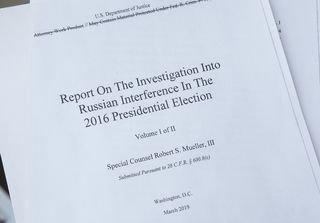
Health
The Mueller Report as Political Personality Source Material
Mental health professionals find troubling insights in the Mueller report.
Posted May 15, 2019
Four psychiatrists and a clinical psychologist have found source material in the Mueller Report to support their belief that Donald Trump is unfit to hold office.
The summation of special counsel Robert Mueller’s investigation into Russian interference in the 2016 presidential election contains multiple indications of Mr. Trump’s “profound impairment,” according to the authors of the mental health report which they prepared on April 25, 2019. In “Mental Health Analysis of the Special Counsel’s Report on the Investigation into Russian Interference in the 2016 Presidential Election,” the professionals say they have a duty to warn the public about dangers posed by “clear and pervasive patterns” apparent in Mr. Trump’s behavior.
The authors include clinical psychologist Edwin B. Fisher of the University of North Carolina-Chapel Hill, and psychiatrists Bandy X. Lee of the Yale School of Medicine, Leonard L. Glass of Harvard Medical School, James R. Merikangas of George Washington University, and James Gilligan of New York University. Each also contributed to The Dangerous Case of Donald Trump: 37 Psychiatrists and Mental Health Experts Assess a President, a book they describe as a public service and from which they took no profit.
“The psychological nature of the president’s impairments is thoroughly revealed in the Mueller report,” Lee, Glass and Fisher wrote in The Boston Globe. “The report has documented the president as willful, enormously self-absorbed, ruthlessly exploitative, threatened, and delusionally heedless of the consequences of his impulsive actions. His dangerousness constitutes a national crisis.”
The authors cite sworn witness testimony—including sources allied with, and opposed to, Mr. Trump—to support their conclusions. They see clear indications of inabilities to take in critical information and to work with advisors, loss of emotional control, peculiar frequent use of “unfair,” an inability to consider consequences, mendacity, rigidity, poor memory, and recklessness.
The psychologic or psychiatric analysis of the president is controversial and vigorously opposed by the leadership of the American Psychiatric Association (APA) and other mental health professionals. “We at the APA call for an end to psychiatrists providing professional opinions in the media about public figures whom they have not examined, whether it be on cable news appearances, books, or in social media,” the APA stated in a January 9, 2018 press release. “Armchair psychiatry or the use of psychiatry as a political tool is the misuse of psychiatry and is unacceptable and unethical.”
The authors of the analysis point out that they are presenting an evaluation of Trump’s capacity to function safely, not a diagnosis of a mental or personality disorder, for which a personal interview is usually required. Mental capacity, they explain, “does not relate primarily to a person’s specific psychiatric diagnosis.”

The analysis of the Mueller Report explains that “for a functional examination, by contrast, there are few tests as informative as observations by the person’s colleagues on his actual performance as to how he is or is not able to function on the job.”
In 1976, an APA task force called “The Psychiatrist as Psychohistorian” recognized the legitimacy of political personality profiles or “psychologically informed leadership studies” of both historical and foreign leaders. Even though in-person interviews are never conducted during such studies, the APA task force approved them as long as no specific diagnoses were made, and the conclusions were the result of well-conducted research.
“We don’t claim to make a psychiatric or neurological diagnosis, although we’d like to,” co-author James Merikangas, M.D. told S.V. Date of the HuffPost website.
“Seldom do we have as much detailed information on a person’s behavior as is contained in the Special Counsel’s report, which has been verified with the accuracy and expertise of a criminal investigation of the highest order,” the authors of the mental health analysis write.
They conclude their analysis by recommending that Trump sit for a formal evaluation by an independent panel of mental health professionals not employed by the government. In the absence of such an in-person evaluation, the authors believe they “have enough evidence to come to a conclusion if necessary,” regarding his mental capacity.
References
Lee, Bandy X., Fisher, Edwin B. Glass, Leonard L. et al. April 25, 2019. “Mental Health Analysis of the Special Counsel’s Report on the Investigation into Russian Interference in the 2016 Presidential Election.”
Lee, Bandy X., Glass, Leonard L., Fisher, Edwin B. “Looking at the Mueller report from a mental health perspective.” May 9, 2019. The Boston Globe.
American Psychiatric Association. January 9, 2018. “APA Calls for End to 'Armchair' Psychiatry.” Press release.
Date, S. V. April 26, 2019. “Psychiatrists Say Mueller Report Offers More Proof Of Trump’s Unfitness.” HuffPost.com.

